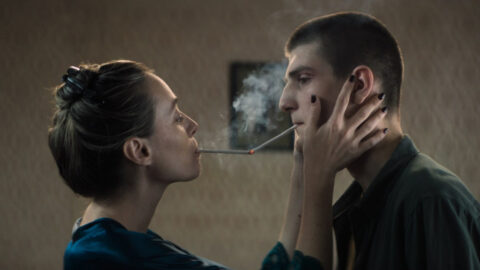Crystal Globe entry Panopticon (George Sikharulidze, 2024) stages the tumult of Georgia — caught between liberalisation on the one hand (as seen in recent protests) and arch conservatism on the other — through the experience of one man: the morally and sexually confused Sandro (Data Chachua).
Chachua brings tenderness and empathy for his protagonist, caught between a burgeoning sexuality, right-wing tendencies and warped religious teachings, yet he’s let down by a timid screenplay that can’t quite figure out what his character wants and how to express his feelings through cinematic language.
At first, it’s easy to feel sorry for Sandro. His ultra-religious father (Malkhaz Abuladze) is leaving to become a monk while his mother (Maiko Gelovani) lives in New York. Living alone with his grandmother (Ketevan Shervashidze), he is quickly susceptible to negative influences, such as the online right-wing cranks warning against immigration, or the Orthodox church’s beliefs around sex before marriage.
But the young man exhibits unfortunate behaviours. He sits too close to girls on the bus; he stares too long on the metro; he even starts touching their behinds as they pass him by in the tunnel. This odd behaviour permeates his whole being. It affects his relationship with his long-standing girlfriend, Tina (Salome Gelenidze), whom he repeatedly slutshames. And it develops into a weird, Freudian and deeply unsettling fascination with his friend Lasha’s (Vakhtang Kedeladze) mother (Ia Sukhitashvili).
The final result plays a little like a Georgian version of Cuck (Rob Lambert, 2019), the Trump-era portrait of a MAGA incel that was equal parts horrifying and tantalising. But like Lambert’s film, Panopticon suffers from a clumsy screenplay, rushed character moments and an unwillingness to go that deep into the ethical morass of today’s young men.
And… if Sandro is supposed to be in the aforementioned Panopticon, where everyone is watching and his behaviour is self-regulated in the process, one would get the sense that society would be more regimented, or his life more scrutinised. But given he basically lives alone and has free rein to do as he wishes, this metaphor feels stretched. It’s almost as if no one is watching, making it the opposite of what the title suggests.
Eventually, circumstances change, but Sandro’s transformation is not believable. Not for any lack of effort on the actor’s part, but due to its unbelievable character developments. Sandro might be ethically dubious but there is certainly some goodness in him. Nonetheless, the film’s reliance on female characters to show him the grace and courtesy he never bothered to give them in the first place stinks of male privilege. I never got the sense he deserved his arc.
This isn’t helped by weak mise en scène, holding the film’s themes at a distance. Romanian cinematographer Oleg Mutu might be behind the camera — for my money, one of the most accomplished cameramen in modern Eastern European cinema — but the images, bathed in beige and brownish tones, do little to elevate the material, with the widescreen ratio repeatedly underutilised. And while Sikharulidze often attempts to slow-burn his way through unethical moments, the framing and editing choices rarely raise the tension, dampening their impact.
Panopticon finishes caught in the middle between something truly provocative and an affecting character study. Neither works.
Redmond is the editor-in-chief of Journey Into Cinema.





